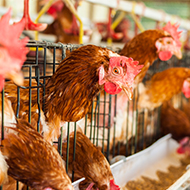Wet winter could mean more ewes need worming, SCOPS says
SCOPS recommends using loss of body condition score to identify which ewes to treat.
Following a wet winter in the UK, the Sustainable Control of Parasites in Sheep (SCOPS) group has said that more ewes might need targeted worming than in previous lambing seasons.
The weather conditions will have had an impact on the overall health of many ewes, and restrictions on sheep movement in some areas due to bluetongue may also have prevented ewes being moved to new pasture on some farms.
As blanket treatment can lead to the development of anthelmintic resistance, SCOPS recommends carefully targeting treatment for ewes which have seen a loss of body condition score, indicating that they are under nutritional stress.
Lesley Stubbings said: “If you just treat those females, which are the ones more likely to produce a high number of worm eggs in their dung, you can reduce the total amount of anthelmintic used this spring compared to blanket treating, without impacting production.
“If you’ve followed this approach before, it wouldn’t be surprising to find yourself treating a few more ewes this year than in previous seasons, given the pressure some ewes have been under.”
The recommended guidance used to be to treat all ewes at lambing time, but SCOPS has adjusted its advice in recent years based on new research.
Ms Stubbings added: “Healthy adult ewes in optimum body condition have good immunity to roundworms and will sustain this if they are well fed, even under the stress of lambing and rearing lambs.”
SCOPS urges producers to speak to their veterinary surgeon and/or animal health adviser about worming.
Image © Shutterstock



 An Avian Influenza Prevention Zone (AIPZ) has been introduced across Wales.
An Avian Influenza Prevention Zone (AIPZ) has been introduced across Wales.